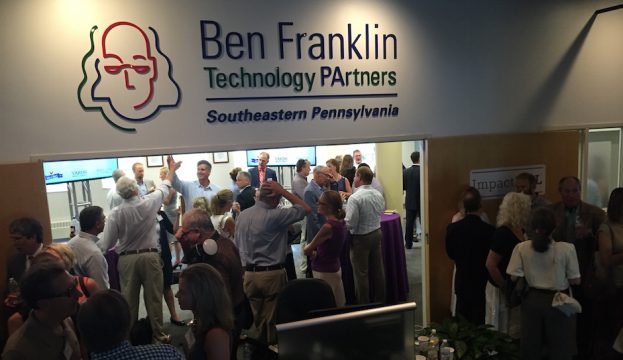Can Philly Become a Hub of the “Impact Economy”?

Representatives from local businesses network at the launch of ImpactPHL | Photo by Brian Thomas
Benjamin Franklin Technology Partners and the Economy League announced yesterday the launch of ImpactPHL, a new initiative designed to bring socially conscious investors and startups together.
The goal of the initiative is to increase investment in impact companies and organizations in Greater Philadelphia by increasing awareness of what the impact economy is and what it can do, the organization says.
So what is the impact economy? The group defines it as “doing well while doing good,” meaning that investors will see a return while also supporting companies that are working to help their community.
Enterprises that directly address a social need or opportunity like environmental sustainability, job creation, or education are examples of impact companies and those who want to invest in them are impact investors. And the customers represent the private and public marketplace, with possible consumers from areas like the government or nonprofits.
Impact investing is a national and international trend, and one that the organizers of the program say could thrive especially well in Philly. Supporters say the city’s history, location between New York City and Washington D.C., higher education institutions, and its high level of human and financial capital are all reasons why.
There was a growing sense that “the traditional ways of doing business are not the only ways of doing business,” said Steve Wray, the executive director of the Economy League, who also stressed that there is a lot of opportunity for economic and social return for investors.
JP Morgan’s 2015 impact investor survey found that the 146 investors they surveyed, most based in the United States, were managing $60 billion in impact investments, an amount that is projected to keep growing in the coming years.
“Most social movements, most innovations, are slow to catch on, and one of the purposes [of this] is to bring focus to the movement and bring people together,” said Tony Carr, president of Halloran Philanthropies. Carr says Halloran has been involved in promoting impact investing and was involved in the planning of ImpactPHL.
In addition to the benefits for the investors and businesses, the impact economy also has the potential to make progress in the social arena in ways that other organizations can’t, according to Harold Epps, Philadelphia’s director of commerce.
“We need to encourage businesses to, in addition to profits, think about how they can make an impact on the community around them,” said Epps. “Government and philanthropic organizations cannot solve these complex challenges by themselves.”
The idea seems to be popular with the philanthropic community too. Ava Lala, a director at Geneva Global, an international philanthropic consulting firm said that now is an “interesting time” in the philanthropic sector, and that “more foundations and philanthropies are starting to think about impact across a spectrum.”
To follow the growth of the impact economy in Philadelphia, follow ImpactPHL on Twitter or on other social media platforms under #ImpactPHL.


